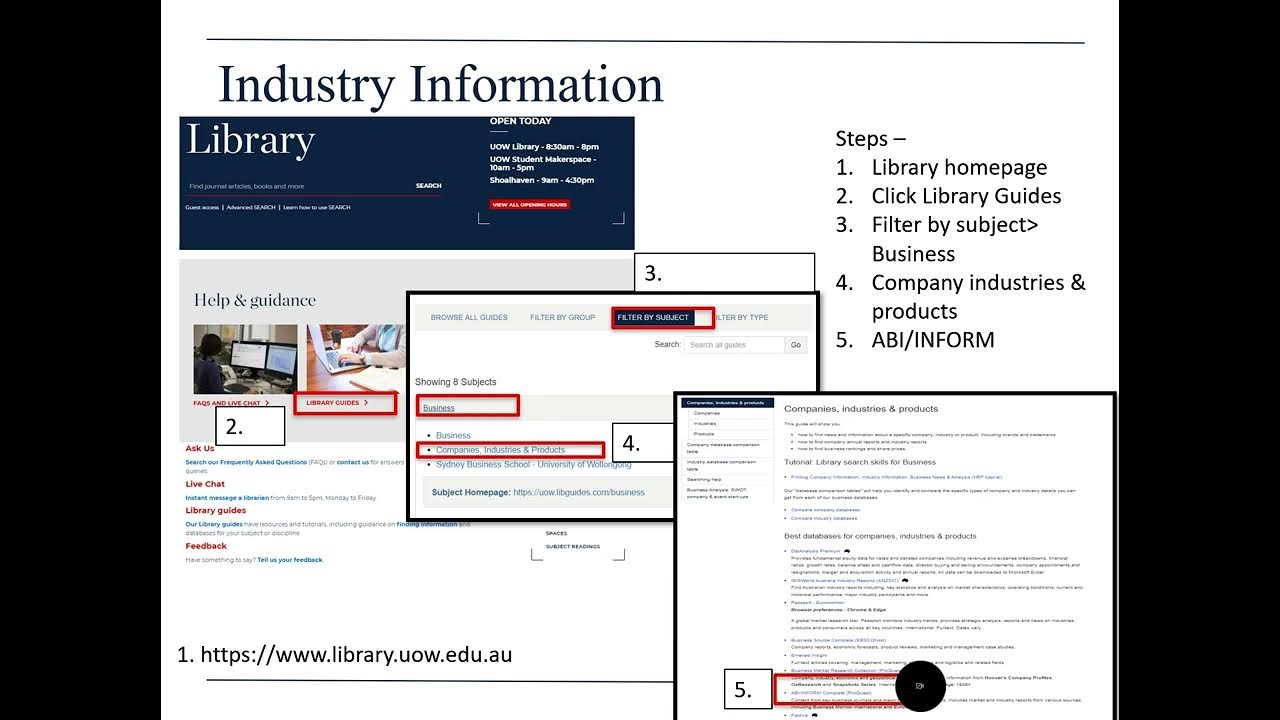Evaluating your sources
Summary
TLDRThis tutorial from the University of Reading guides students on how to evaluate various sources of information, including books, websites, and data. It emphasizes the importance of selecting sources that fit academic purposes, such as using scholarly peer-reviewed articles for authoritative arguments. The tutorial also discusses the value of library resources over general web searches and offers tips on evaluating websites. The overall goal is to help students choose reliable, current, and appropriate sources that will strengthen their academic work.
Takeaways
- 📚 Not all sources are equal: Different types of sources like books, websites, blogs, or interviews serve different purposes depending on what you need them for.
- 🔍 Evaluate your sources: Always think about the purpose you want the source to serve and check if it’s suitable for that purpose.
- 📰 Newspaper articles: While they can provide evidence for popular opinions, they may lack scholarly authority and are not suitable for academic referencing.
- 📖 Scholarly sources: To support arguments with authority, refer to peer-reviewed academic books and journal articles that are credible and reliable.
- 👥 Peer review: Peer-reviewed sources are evaluated by experts and are more reliable for academic purposes.
- 📅 Stay up-to-date: It's usually better to use the most recent publications unless you’re referencing an important standard work in the field.
- 🔎 University library tools: Unlike general search engines, university libraries pre-select sources appropriate for academic use, though you still need to check dates and relevance.
- 🖥️ Evaluating websites: Always check for a named author, publication date, and objective, as well as references to ensure the site’s credibility.
- ⚠️ Wikipedia caution: Wikipedia is useful for general background but not reliable for academic citations because anyone can edit its content.
- 🎯 Tailor your sources: Make sure that the sources you use are reliable, current, and appropriate for your level of study to add value to your assignments.
Q & A
What types of sources are mentioned in the tutorial?
-The tutorial mentions various sources including books, journal articles, websites, primary research data, tabloid newspaper articles, blog posts, interviews, physical objects (e.g., statues, bus tickets), and video tutorials.
Why is it important to evaluate the suitability of a source for its intended purpose?
-Different sources serve different purposes. For example, a newspaper article might be good for discussing public opinions, but it lacks the scholarly authority required for academic arguments. Evaluating suitability ensures that the source is appropriate for the task at hand.
What is peer review, and why is it important in evaluating sources?
-Peer review means that a source has been evaluated by experts in the same field before publication. This process ensures that the information is authoritative and credible, making peer-reviewed sources ideal for academic use.
How can you identify if a source is scholarly?
-A scholarly source is usually aimed at an academic audience, such as students or tutors. It often contains complex ideas, is written at an advanced level, and may be peer-reviewed. Scholarly sources typically provide references and are written by experts in the field.
What role does publication date play in evaluating a source?
-The publication date is crucial, especially when looking for the most current research. More recent publications usually incorporate previous research, making them more relevant. However, in some fields, foundational works may still be valuable even if they are older.
How can the University Library help in finding reliable sources?
-The University Library catalogs books that are suitable for university-level study. It also offers tools like the Summon search engine, which allows users to filter for scholarly, peer-reviewed articles and limit search results to recent publications or specific disciplines.
What factors should be considered when evaluating websites as sources?
-When evaluating websites, consider whether the author is named, the purpose and audience of the site, whether the page is up to date, and if it provides references for any figures or data. Ensure that the author is credible and that the site offers objective, authoritative information.
Is Wikipedia a reliable source for academic work?
-Wikipedia can be useful as a starting point for basic understanding but is not considered reliable for academic work. Since anyone can edit it, it lacks the authority and scholarly rigor needed for supporting academic arguments.
What are the main criteria for evaluating a source's reliability?
-Key criteria include the source's authority (e.g., author credentials, peer review), objectivity, relevance, publication date, and the level at which it is written. For academic work, sources should be current, reliable, and appropriate for the level of study.
What is the main takeaway from the tutorial about evaluating sources?
-The key message is that evaluating your sources carefully based on their reliability, relevance, and suitability for the task will significantly enhance the quality of your academic work. Good sources will add credibility and depth to your assignments.
Outlines

هذا القسم متوفر فقط للمشتركين. يرجى الترقية للوصول إلى هذه الميزة.
قم بالترقية الآنMindmap

هذا القسم متوفر فقط للمشتركين. يرجى الترقية للوصول إلى هذه الميزة.
قم بالترقية الآنKeywords

هذا القسم متوفر فقط للمشتركين. يرجى الترقية للوصول إلى هذه الميزة.
قم بالترقية الآنHighlights

هذا القسم متوفر فقط للمشتركين. يرجى الترقية للوصول إلى هذه الميزة.
قم بالترقية الآنTranscripts

هذا القسم متوفر فقط للمشتركين. يرجى الترقية للوصول إلى هذه الميزة.
قم بالترقية الآنتصفح المزيد من مقاطع الفيديو ذات الصلة

Grade 10 English Q1 Ep 7 Sources of information : Accessibility and Effectiveness

How To Use NotebookLM For Beginners In 2024 (NotebookLM Tutorial)

Grade 8 English Q1 Ep3: Writing Bibliography

Ayo Tingkakan Kemampuan Literasi dalam Mata Pelajaran IPAS

✅ FUENTES DE INFORMACIÓN (TIPOS, USOS Y CÓMO ENCONTRARLAS)

MBAS906 Business Analytics Research Consultancy workshop
5.0 / 5 (0 votes)
